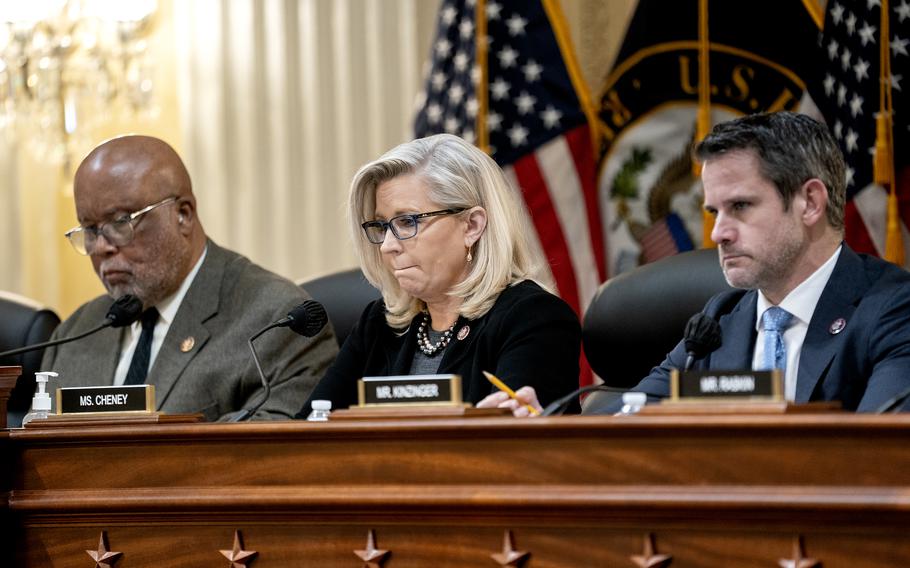
Rep. Bennie Thompson, R-Miss., left, chairman of the House Jan. 6 committee, with Reps. Liz Cheney, R-Wyo., and Adam Kinzinger, R-Ill., at a hearing in the Cannon House Office Building in Washington, D.C., on Dec. 1, 2021. (Stefani Reynolds/For The Washington Post )
WASHINGTON — Rep. Liz Cheney, R-Wyo., said there was an “extremely broad” and “extremely well-organized” conspiracy by then-President Donald Trump and his allies to overturn the results of the 2020 election — and that the Jan. 6, 2021, attack on the U.S. Capitol was just one instance in “an ongoing threat” to democracy.
“We are not in a situation where former president Trump has expressed any sense of remorse about what happened,” Cheney, the vice chair of the House select committee investigating the Jan. 6 insurrection, told CBS News’s Robert Costa.
“We are, in fact, in a situation where he continues to use even more extreme language, frankly, than the language that caused the attack,” she added. “And so, people must pay attention. People must watch, and they must understand how easily our democratic system can unravel if we don’t defend it.”
Cheney’s remarks, which aired Sunday, come days before the committee begins prime-time, televised hearings throughout June that will feature live witnesses, taped interviews with key figures — including Trump family members — and previously unseen video footage. The hearings mark the culmination of an inquiry that has involved more than 1,000 interviews and reviews of more than 125,000 records.
Cheney said she felt certain that the evidence laid out in the hearings would compel Americans to pay attention, even as she suggested that many of her fellow Republicans have “pledged their allegiance” to Trump over the country.
“I think there is absolutely a cult of personality around Donald Trump,” Cheney told Costa. “And I think that, you know, the majority of Republicans across the country don’t want to see our system unravel. They understand how important it is to protect and defend the Constitution.”
Rep. Adam Schiff, D-Calif., another member of the Jan. 6 select committee, said the panel hoped the hearings would counter Trump’s continued propagation of the baseless assertion — what some of his critics call the “big lie” — that widespread voter fraud cost him the 2020 election. Schiff also said there was a great deal the American public had not yet seen about the Jan. 6 attack.
“But perhaps most important is the public hasn’t seen it woven together, how one thing led to another, how one line of effort to overturn the election led to another and ultimately led to terrible violence, the first non-peaceful transfer of power in our history,” Schiff said on CBS News’s “Face the Nation” on Sunday. “So we want to tell that comprehensive narrative, and we’re aiming at [an audience], frankly, that still has an open mind about these facts.”
It is unclear who remains open-minded about the events of Jan. 6, with polls showing little bipartisan agreement over the insurrection. Several high-profile Republicans have refused to cooperate with the committee, with varied consequences. The Justice Department announced Friday that it had indicted former Trump adviser Peter Navarro but would not pursue charges against former Trump chief of staff Mark Meadows and former communications chief Daniel Scavino Jr.
Schiff said Sunday that he could not confirm or deny which witnesses would appear before the committee during the public hearings and called the Justice Department’s decision not to pursue charges against Meadows and Scavino “a grave disappointment” that could impede the panel’s work.
“I can say that certainly one of the themes that we will be fleshing out is the fact that in advance of the 6th, that there was an understanding of the propensity for violence that day, of the participation of white nationalist groups, of the effect that the continued propagation of this ‘big lie’ to rile up the country and rile up the president’s base was likely to lead to violence,” he said.
For the few Republicans who have tried to hold Trump accountable for his role in the attack, the blowback from their party has been swift. Of the 10 Republicans who voted to impeach Trump after Jan. 6, four are leaving Congress rather than seek reelection. Others face tough primary challenges.
Rep. Tom Rice of South Carolina, who was one of those 10 Republican lawmakers who voted to impeach Trump, acknowledged Sunday that he could lose his seat over the vote but said it would still be worth it. Only if Trump apologized, Rice said, would he consider supporting the former president again.
Rice said his impeachment vote “wasn’t that hard” after he thought about Trump’s inactivity on the day of the insurrection, including putting the lives of then-Vice President Mike Pence and Pence’s family members at risk and watching police officers defending the Capitol being beaten for hours.
“The more I read about that, the more I learned about — it was clear to me what I had to do,” Rice said. “I was livid. I’m livid today about it. Now, I took an oath to protect the Constitution, and I did it then and I would do it again tomorrow.”
The Washington Post’s Jacqueline Alemany, Josh Dawsey and Amy Gardner contributed to this report.